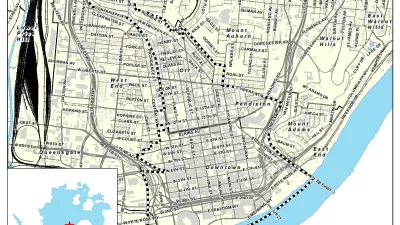Recognizing the obstacle to redevelopment and livability presented by its outdated parking requirements, Cincinnati leaders have reduced parking minimums in the central business district and historic Over-the-Rhine neighborhood, reports Randy Simes.
Pleas by urban advocates to reform Cincinnati's outdated parking policies have found a welcome reception within the city's leadership, as "an amendment to the city’s zoning code that eliminates parking requirements for many residential developments and substantially reduces them for others," was approved by Cincinnati Mayor Mark Mallory (D) earlier this month.
“The goal of the ordinance is to encourage development in the urban core by permitting developers to determine their own parking needs for downtown developments,” explained [city council member Yvette] Simpson, who is vice chair of council’s Livable Communities Committee.
“This ordinance will encourage private investment by reducing the amount of government regulation,” she continued. “This also encourages a walkable, pedestrian-friendly urban core, which is more attractive to residents and visitors.”
FULL STORY: City tosses out residential parking requirements

Maui's Vacation Rental Debate Turns Ugly
Verbal attacks, misinformation campaigns and fistfights plague a high-stakes debate to convert thousands of vacation rentals into long-term housing.

Planetizen Federal Action Tracker
A weekly monitor of how Trump’s orders and actions are impacting planners and planning in America.

San Francisco Suspends Traffic Calming Amidst Record Deaths
Citing “a challenging fiscal landscape,” the city will cease the program on the heels of 42 traffic deaths, including 24 pedestrians.

Defunct Pittsburgh Power Plant to Become Residential Tower
A decommissioned steam heat plant will be redeveloped into almost 100 affordable housing units.

Trump Prompts Restructuring of Transportation Research Board in “Unprecedented Overreach”
The TRB has eliminated more than half of its committees including those focused on climate, equity, and cities.

Amtrak Rolls Out New Orleans to Alabama “Mardi Gras” Train
The new service will operate morning and evening departures between Mobile and New Orleans.
Urban Design for Planners 1: Software Tools
This six-course series explores essential urban design concepts using open source software and equips planners with the tools they need to participate fully in the urban design process.
Planning for Universal Design
Learn the tools for implementing Universal Design in planning regulations.
Heyer Gruel & Associates PA
JM Goldson LLC
Custer County Colorado
City of Camden Redevelopment Agency
City of Astoria
Transportation Research & Education Center (TREC) at Portland State University
Jefferson Parish Government
Camden Redevelopment Agency
City of Claremont





























